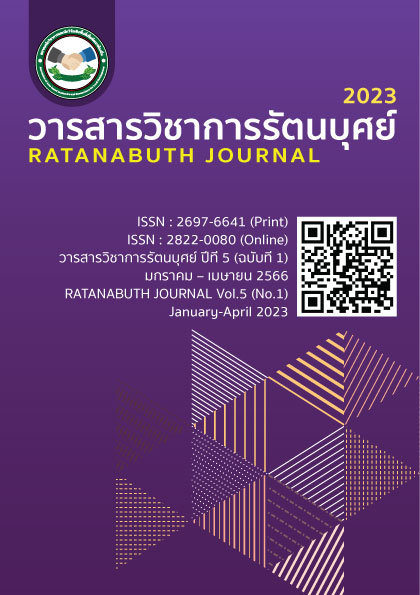The Factors analysis of Digital Competency for Education Management Administrators Under The Loei Primary Education Area 1 The Factors analysis of Digital Competency for Education Management Administrators Under The Loei Primary Education Area 1
Main Article Content
Abstract
The objectives of this dissertation were as follows: 1) to explore the factors analysis of digital competency for education management administrators under the Loei primary education area 1 2) to examine the goodness of the factors analysis of digital competency for education management administrators under the Loei primary education area 1 with empirical data measurement, while the confirmatory factor analysis of data was also conducted. The data of this quantitative research were collected from 500 samples consisting of basic school administrators under the Loei primary education area 1 in the academic year 2022. The five-scale questionnaire was the research tool. The data were analyzed by mean, standard deviation, distribution coefficient, and factor analysis through computerized statistical program.
According to research results:
- The factors analysis of digital competency for education management administrators under the Loei primary education area 1 included four components: (1) Digital literacy (2) Digital Vision (3) Management and Digital Leadership and (4) Digital Culture.
2. The measurement model of each component developed from the theory and research was positively consistent with the empirical data; P-value = 0.17, Chi-square/df = 1.24, SRMR = 0.01, RMSEA = 0.03, NFI = 0.99, NNFI = 1.00, GFI = 0.99 and AGFI = 0.97
Article Details

This work is licensed under a Creative Commons Attribution-NonCommercial-NoDerivatives 4.0 International License.
References
กระทรวงดิจิทัลเพื่อเศรษฐกิจและสังคม. (2559). แผนพัฒนาดิจิทัลเพื่อเศรษฐกิจและสังคม ระยะ 3 ปี (พ.ศ.2559- 2561). กรุงเทพฯ : กระทรวงดิจิทัลเพื่อเศรษฐกิจและสังคม.
กระทรวงเทคโนโลยีสารสนเทศและการสื่อสาร. (2559). แผนพัฒนาดิจิทัลเพื่อเศรษฐกิจและสังคม.กรุงเทพฯ : กระทรวงเทคโนโลยีสารสนเทศและการสื่อสาร.
กัญญารัตน์ สุขแสน. (2564). รูปแบบการพัฒนาภาวะผู้นำด้านดิจิทัลของผู้บริหารโรงเรียนในเครือมูลนิธิคณะเซนต์คาเบรียลแห่งประเทศไทย. วิทยานิพนธ์ศึกษาศาสตรดุษฎีบัณฑิต สาขาวิชาการศึกษาวิทยาลัยครูสุริยเทพ มหาวิทยาลัยรังสิต.
กมลทิพย์ อินแก้วเครือ. (2564). ทักษะและภาวะผู้นาของผู้บริหารสถานศึกษาในยุคดิจิทัล. วารสารการประชุมวิชาการนำเสนอผลงานวิจัยระดับชาติและนานาชาติ ครั้งที่ 14. 14(1): 985–990.
กุลนที ทองจันท์. (2562). ผู้บริหารยุคใหม่กับเทคโนโลยีสารสนเทศ. สืบค้นเมื่อ 25 มกราคม 2565 จาก https://www.gotoknow.org/posts/429105.
ชวลิต เกิดทิพย์, ผ.ว., ชุมศักดิ์ อินทร์รักษ์ และวสันต์ อติศัพท์,. (2552). รูปแบบการพัฒนาภาวะ ผู้นำทางเทคโนโลยีการศึกษาสาหรับผู้บริหารโรงเรียนสังกัดสานักงานคณะกรรมการ การศึกษาขั้นพื้นฐานในภาคใต้. สงขลานครินทร์ ฉบับสังคมศาสตร์และมนุษยศาสตร์.
ชุติรัตน์ กาญจนธนชัย. (2562). ตัวบ่งชี้ภาวะผู้นำดิจิตอลของผู้บริหารสถานศึกษา สังกัดสำนักงานคณะกรรมการการศึกษาขั้นพื้นฐาน. ปริญญานิพนธ์ศึกษาศาสตรดุษฎีบัณฑิต สาขาวิชาการบริหารการศึกษา บัณฑิตวิทยาลัย มหาวิทยาลัยมหามกุฏราชวิทยาลัย.
ต้องลักษณ์ บุญธรรม. (2559). การเป็นผู้นำยุคเศรษฐกิจดิจิทัลกับการพัฒนาที่ยั่งยืนขององค์กรทางการศึกษา. วารสารวิชาการครุศาสตร์อุตสาหกรรมพระจอมเกล้าพระนครเหนือ, 7(1), 220-221.
ทินกร บัวชู. (2562). ภาวะผู้นำดิจิทัลของผู้บริหารสถานศึกษา The Status of Digital Leadership of Education Management Administrators. วารสารครุศาสตร์สาร, 13(2), 285-294.
ธิดา แซ่ชั้น และ ทัศนีย์ หมอสอน. (2559). การรู้ดิจิทัล: นิยาม องค์ประกอบ และสถานการณ์ ในปัจจุบัน. Journal of Information Science, 34(4), 116-145.
นงลักษณ์ วิรัชชัย. โมเดลลิสเรล : สถิติวิเคราะห์สำหรับการวิจัย. กรุงเทพมหานคร: สำนักพิมพ์แห่งจุฬาลงกรณ์มหาวิทยาลัย, 2542.
บุญอนันต์ พินัยทรัพย์. (2562). การพัฒนาทรัพยากรมนุษย์ในยุคดิจิทัล = Human resource development in the digital era. กรุงเทพฯ : โครงการเอกสารและตำรา คณะรัฐประศาสนศาสตร์ สถาบันบัณฑิตพัฒนบริหารศาสตร์.
ปกรณ์ ลี้สกุล. (2561). Leadership in Digital Era : ภาวะผู้นำในโลกดิจิทัล. สืบค้นเมื่อ 15 มกราคม 2565. จาก https://today.line.me/th/pc/article/Leadership+in+Digital+Era.
ศศิวิมล ม่วงกล่ำ. (2562). การวิเคราะห์องค์ประกอบด้านความสามารถทางดิจิทัลของครูและบุคลากรทางการศึกษา จังหวัดสระบุรี. วิทยานิพนธ์ปริญญามหาบัณฑิต, มหาวิทยาลัยเทคโนโลยีราชมงคลธัญบุรี.
เศรษฐพงค์ มะลิสุวรรณ (2561). การเปลี่ยนผ่านทางดิจิทัลของประเทศไทย เพื่อนำไปสู่ Thailand 4.0. วารสารกสทช, 2(ธันวาคม), 24-42.
สุชญา โกมลวานิช และคณะ. (2563). องค์ประกอบของภาวะผู้นำดิจิทัลของผู้บริหารสถานศึกษาสังกัดสำนักงานเขตพื้นที่การศึกษามัธยมศึกษาเขต 23. ใน สุรศักดิ์ วงศ์รัตนชีวิน (บ.ก.) การประชุมวิชาการเสนอผลงานวิจัยระดับบัณฑิตศึกษาแห่งชาติ ครั้งที่ 21 (น.700-708). มหาวิทยาลัยขอนแก่น.
สำนักงานคณะกรรมการดิจิทัลเพื่อเศรษฐกิจและสังคมแห่งชาติ กระทรวงดิจิทัลเพื่อเศรษฐกิจและสังคม. (2563). กรอบสมรรถนะดิจิทัลสำหรับพลเมืองไทย. สืบค้นเมื่อ 20 มกราคม 2565. จาก https://web.parliament.go.th/assets/portals/1/files/ digital_competence_framework_for_thai_citizens.pdf.
สำนักงานปลัดกระทรวงศึกษาธิการ. (2561). ยุค Digital 4.0 เมื่อโลกขับเคลื่อนด้วยเทคโนโลยี. สืบค้นเมื่อ 17 มกราคม 2565. จาก http://www.ops.moe.go.th/ops2017.
สำนักงานพัฒนาวิทยาศาสตร์และเทคโนโลยีแห่งชาติ. (2559). การรู้ดิจิทัล (Digital Literacy). สืบค้นเมื่อ 21 มกราคม 2565, จาก https://www.nstda. or.th/th/nstda-/2632-digital-literacy.
เอกชัย กี่สุขพันธ์. (2559). การบริหารสถานศึกษายุคดิจิทัล (School Management in Digital Era). สืบค้นเมื่อ 15 มกราคม 2565. จาก https://www.trueplookpanya.com/knowledge/content/52232/-edu-teaartedu-teaart-teaartdir.
เอกรัตน์ เชื้อวังคำ, วัลลภา อารีรัตน์. (2564). องค์ประกอบของภาวะผู้นำดิจิทัลของผู้บริหารสถานศึกษาสังกัดสำนักงานเขตพื้นที่การศึกษาประถมศึกษาอุดรธานี เขต 4. การประชุมผลงานวิชาการระดับบัณฑิตศึกษาแห่งชาติ ครั้งที่ 22. วันที่ 24 มีนาคม 2564 ณ มหาวิทยาลัยขอนแก่น.
Ala-Mutka, K., Punieand, Y., & Redecker, C. (2008). Digital competence for lifelong learning: policy brief. Luxembourg: Office for Official Publications of the European Communities.
American Institute for Research. (2009). Evaluation of the school technology leadership initiative: (report 2). Washington DC: American Institutes of Research.
ISTE. (2009). National Educational Technology Standard for administrators. Retrieved January 15, 2022 from http://www.iste.org/standards/ISTE-standards/standards-Foradministrators.
Sheninger, E. (2013). 7 Pillars of Digital Leaders. Retrieved January 15, 2022 from http://www.teachthought.com/technology/7-pillars-digitalleadership-education.
Sullivan, L. (2017). 8 Skills Every Digital Leader Needs. Retrieves January 16, 2022, from https://www.cmswire.com/digital-workplace/8-skills-every-digital-leader-needs/


